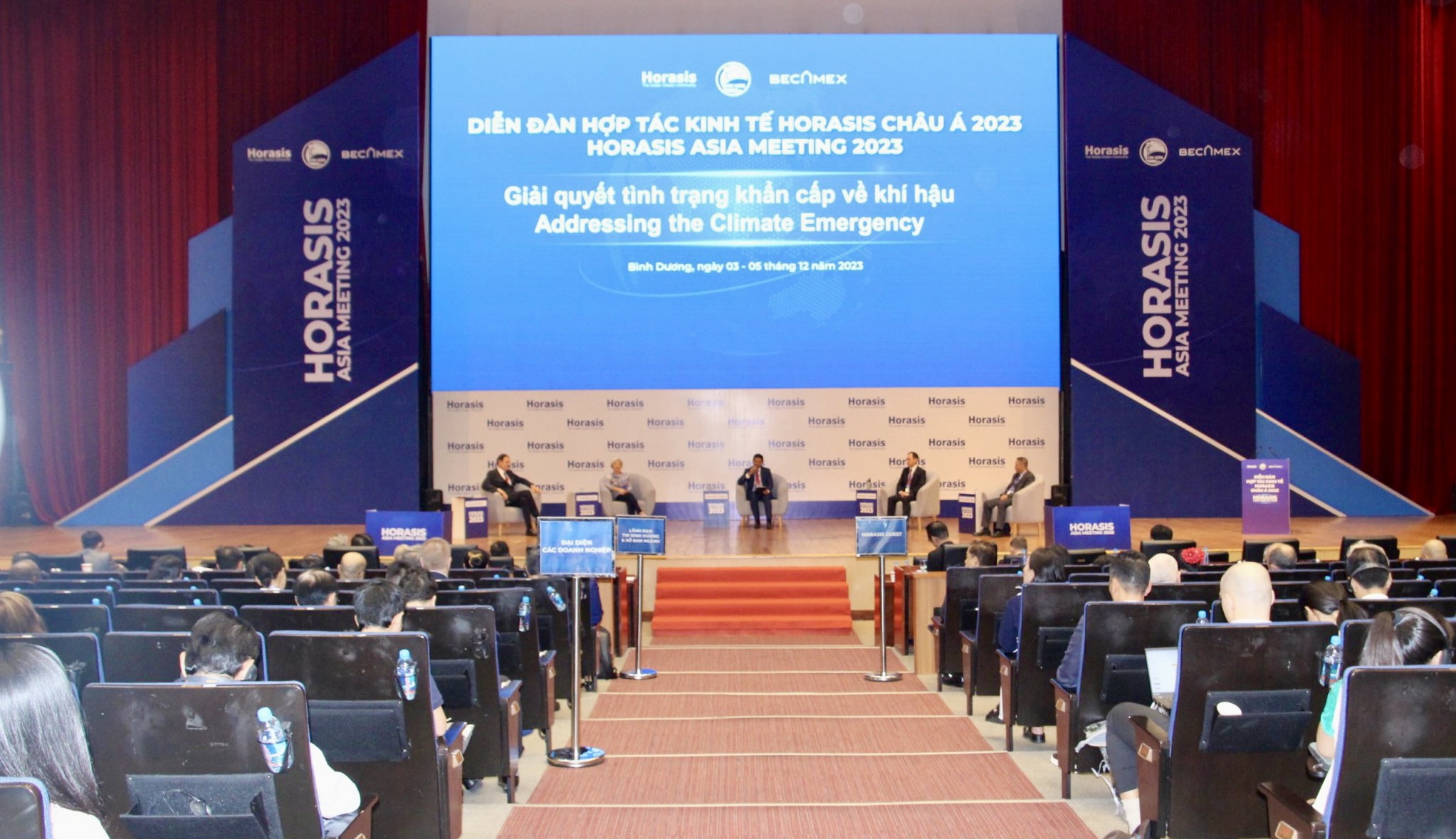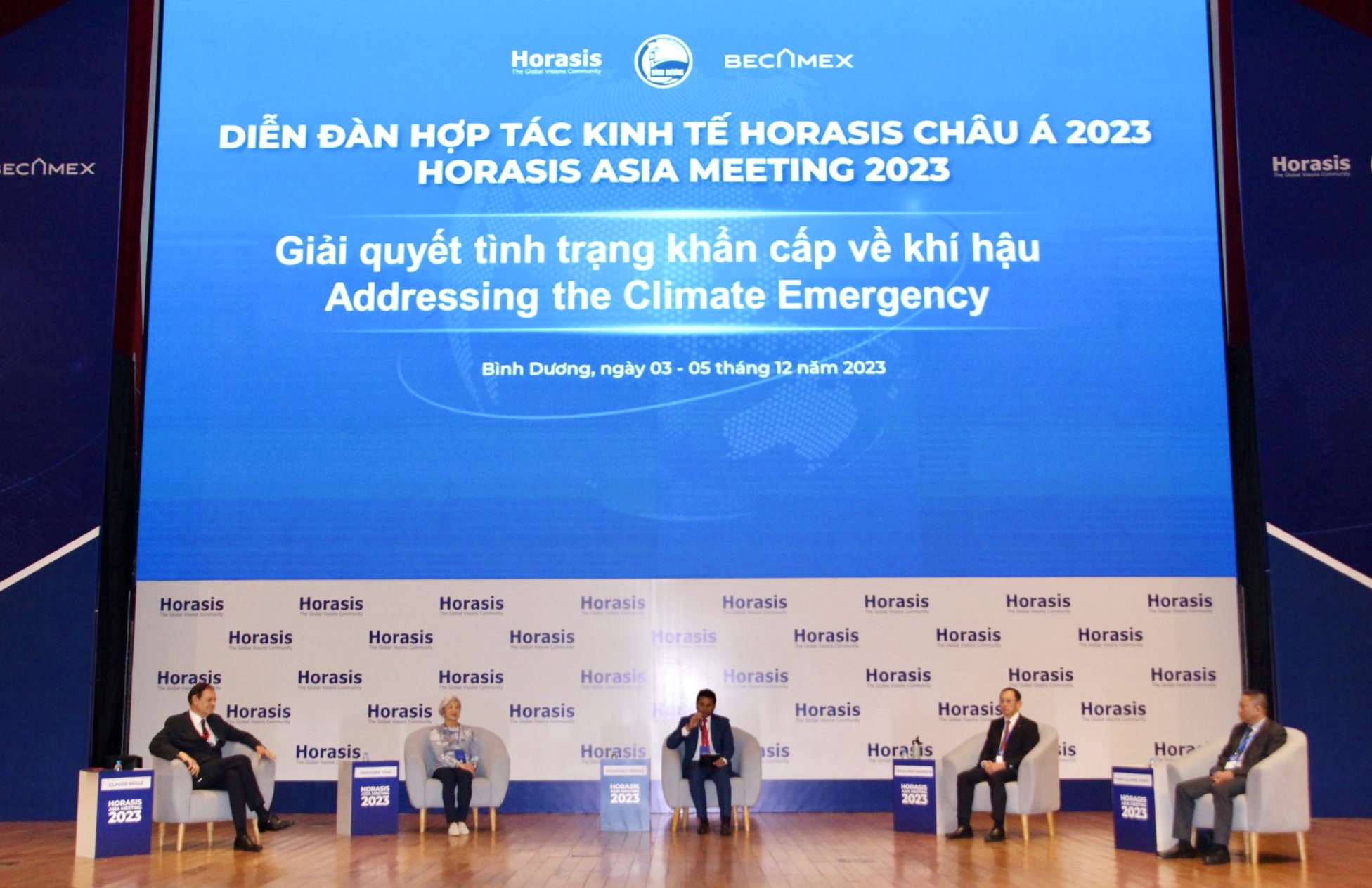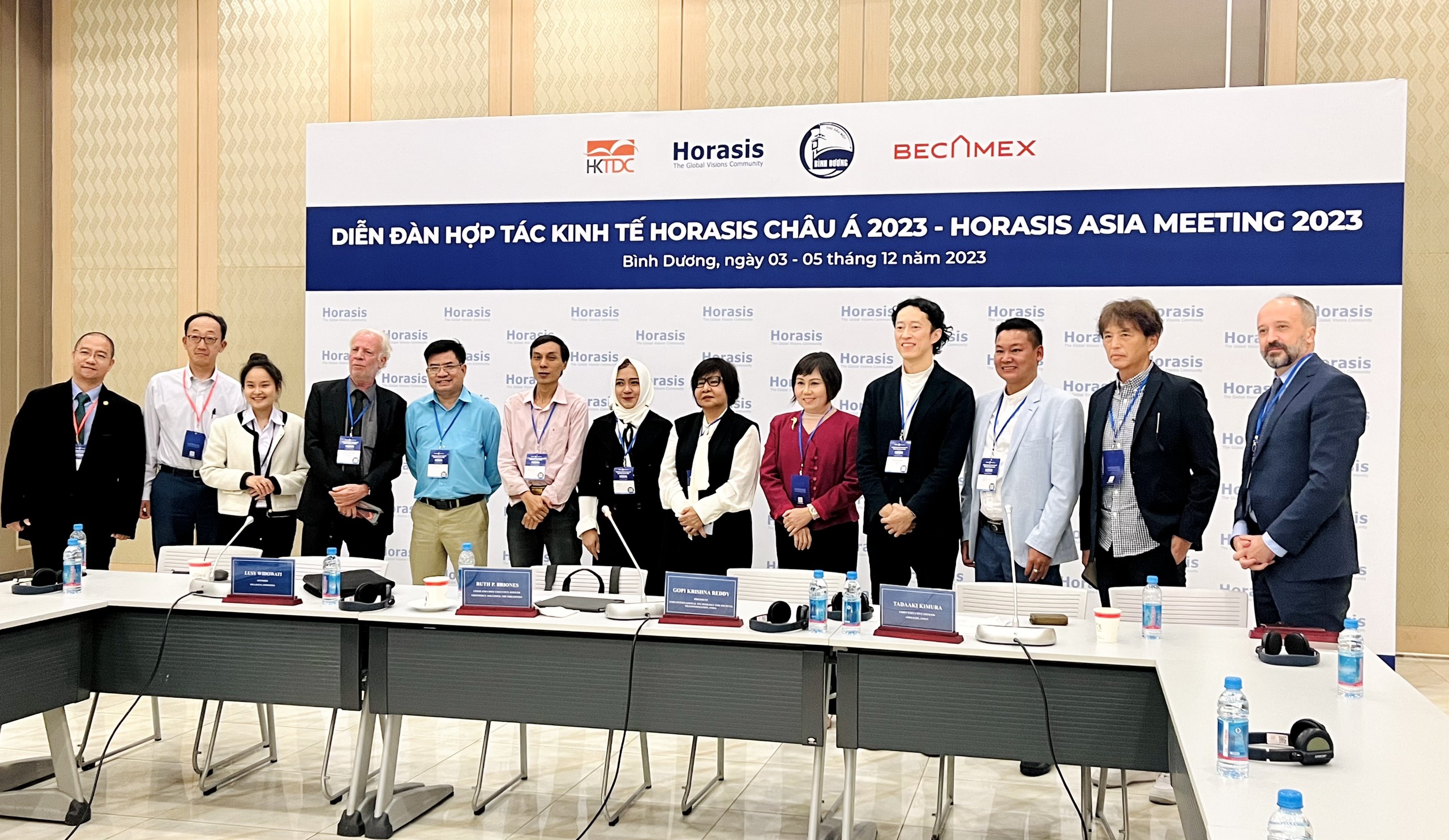Drastically take action to respond to climate change
At the Plenary session with the topic "Addressing the climate emergency", attending were Mr. Vo Van Minh - Deputy Secretary of the Provincial Party Committee, Chairman of the Provincial People's Committee (PPC); Mr. Mai Hung Dung - Member of the Provincial Standing Party Committee, Permanent Vice Chairman of the PPC; Dr. Frank-Jürgen Richter -Chairman of Horasis.
According to experts, climate change is always the biggest challenge to the current and future living environment of humans. Globally, the pressure to mitigate climate change is increasing, and Asia is no exception to that pressure. Delegates discussed solutions to minimize negative impacts on the climate in Asia and Viet Nam.
![]()

Overview of the Plenary session
According to Mr. Mohamed Irshad - Director of Business Relations for ASEAN, TCS, Singapore, the international community is increasingly aware of the urgency of climate change. The world is also gradually forming a political consensus on the need for collective efforts on a global scale to address this problem in the context that many countries and territories are still suffering from more extreme weather phenomena as a result of climate change. However, the world's actions to respond to climate change seem to be insufficient, countries still set short-term goals rather than paying attention to long-term benefits.
Delegates attend the plenary session
Mr. Dang Quang Vinh - Senior private sector specialist of the World Bank said that as one of the countries greatly affected by natural disasters and climate change, Viet Nam identifies green growth as an important strategy towards sustainable development. Viet Nam actively participates in the international community's joint efforts to combat climate change; at the same time, aim to restructure the energy industry in the direction of prioritizing and taking advantage of renewable and clean energy sources. In the field of agriculture, Viet Nam develops agriculture in the direction of ecological and organic agriculture, applying production processes that are environmentally friendly and safe for human health, aiming at high-tech agriculture.
Recently, the World Bank spent 120 million USD to support Viet Nam in implementing the Project "Sustainable development of one million hectares specializing in high-quality rice cultivation associated with green growth in the Mekong Delta". Besides, it also supports the implementation of projects on protecting and developing Viet Nam's national forests, using solar energy for facilities, contributing to attracting investors in this issue.
![]()

Experts discuss current solutions to cope with climate change
Experts highly appreciate efforts to convert energy, protect the environment, and mitigate climate change of Viet Nam in general and Binh Duong in particular through a green, smart development orientation, selectively attracting high-tech investors and specific projects.
To address the climate emergency, experts also stated that the main solution is to effectively apply today's advanced technologies and inventions; minimize the use of plastic waste and aim for clean energy conversion. Viet Nam needs to have specific, drastic, and bold mechanisms and policies to adapt and change. In which the issue of perception and action is an absolute decision.
The Vietnamese government needs to strengthen management and leadership capacity in the fight against climate change; integrate the goal of carbon neutrality into development policies and decisions to truly transform clean, green production in the fields of industry, agriculture, transportation, and energy, etc. In addition, focusing on promoting stronger global actions, commitments need to be accompanied by specific measures, calling for cooperation and sponsorship from foreign organizations, partners, and investors. "Green" projects need to be strongly promoted to increase renewable energy, create more jobs, bring higher short-term profits, and increase long-term cost savings.
Energy transition, moving towards net zero emissions
The dialogue session "Developing an Asian Clean Energy Transition Roadmap" discussed and suggested solutions for Asian countries in general and Viet Nam in particular to quickly achieve the zero-carbon goal by 2050.
Asia is home to some of the world's largest greenhouse gas emitters, and countries in the region have varying degrees of commitment to the clean energy transition. Energy transition, replacing traditional fossil fuel sources to using cleaner, low-emission forms of energy and moving towards carbon neutrality is a global trend.
According to a report by the Ministry of Industry and Trade, Viet Nam's energy demand has continuously grown at a high rate compared to other countries in the region and the world. It is forecasted that in the next 5 years, electricity demand will still grow at about 8.5%/year. Therefore, using energy economically and effectively is a practical solution to help improve economic efficiency, while helping to conserve national energy resources, protect the environment and reduce greenhouse gas emissions, contributing to minimizing the impacts of global climate change.
![]()

Delegates participating in the discussion session take a souvenir photo
Currently, Viet Nam is striving to reduce at least 30% of total methane emissions by 2030 in farming, animal husbandry, solid waste management, wastewater treatment, oil and gas exploitation, coal mining, fossil fuel consumption and moving towards achieving carbon neutrality by 2050.
At the Dialogue Session, Ms. Ruth P. Briones - Chairman and CEO of Greenery Solutions, Philippines affirmed that firmly ensuring national energy security is the foundation and an important premise for socio-economic development. Therefore, Viet Nam needs to prioritize rapid and sustainable energy development associated with protecting the ecological environment. In Viet Nam, electricity production is the largest source of carbon emissions because there are still many coal-fired power plants in operation. Developing renewable energy will contribute to helping Viet Nam reach carbon neutrality by 2050.
Mr. Tadaaki Kimura - CEO of Addlight, Japan, assessed that developing renewable energy will help Viet Nam achieve the goal of net zero emissions by 2050. Accordingly, Viet Nam needs to redirect most of its energy to wind and solar power, ensuring that by 2050 the installed wind power capacity reaches about 150GW, most of which is offshore wind power and solar power capacity is about 70GW; the remaining capacity needs to be converted to hydropower and stop using coal after 2030. "If Viet Nam can exploit its natural advantages, it can be a net exporter of renewable energy and become a green hydrogen production center". - Mr. Tadaaki Kimura commented.
Many experts also emphasize that replacing fossil fuels and switching to electricity is the current trend in the world. New power sources will have to be produced from renewable energy such as wind power, solar power, power from ocean waves, from waste/biomass, etc. which Viet Nam is a country with potential to develop on a large scale.
However, experts also believed that it is necessary to calculate the real potential, perfect the legal system, mechanisms, and policies to develop this power source. Especially capital to invest in technology, or policies to help enterprises promote innovation.